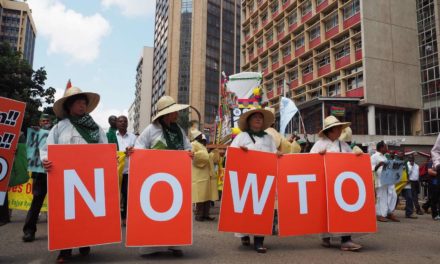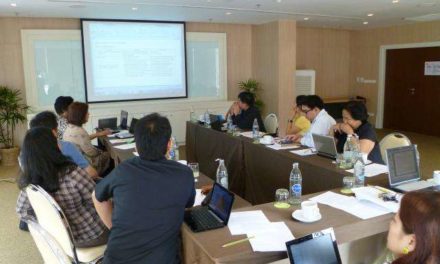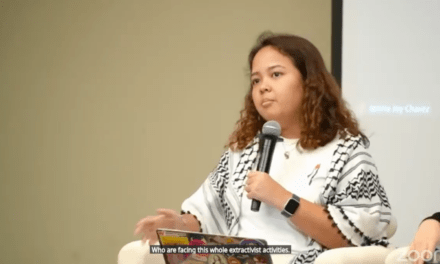By Walden Bello
International trade today is one of the key battlefields between pro-corporate globalization and anti-corporate globalization forces. This struggle is likely to become more intense in the next few months as the pro-globalization forces set in motion their drive to expand the powers of the World Trade Organization at the Fifth Ministerial of the WTO which will be held in Cancun, Mexico, in mid-September 2003.
As in every theater of struggle, strategy must respond to the needs of the moment. This can only be derived by identifying the strategic objective, accurately assessing the global context or conjuncture, and elaborating an effective strategy and tactical repertoire that responds to the particularities of the conjuncture.
For the movement against corporate-driven globalization, it seems fairly clear that the strategic goal must be halting or reversing WTO-mandated liberalization in trade and trade-related areas. The context or “conjuncture” is characterized by a fragile victory on the part of the free-trade globalizers at the 4th Ministerial at Doha, where they bludgeoned developing countries into agreeing to a limited round of trade talks for more liberalization on agriculture, services and industrial tariffs. The conjuncture is marked by the globalizers’ effort to build momentum so as to have the coming 5th Ministerial in Mexico launch negotiations for liberalization in the so-called trade related areas of investment, competition policy, government procurement, and trade facilitation. Their aim is to have the 5th Ministerial expand the limited set of negotiations they extracted at Doha into a comprehensive round of negotiations that would rival the Uruguay Round.
This expansion of the free trade mandate and the expansion of the power and jurisdiction of the WTO, which is now the most powerful multilateral instrument of the global corporations, is a mortal threat to development, social justice and equity, and the environment. And it is the goal that we must thwart at all costs, for we might as well kiss goodbye to sustainable development, social justice, equity, and the environment if the big trading powers and their corporate elites have their way and launch another global round for liberalization during the WTO’s 5th Ministerial Assembly in Mexico in 2003.
CAMPAIGN OBJECTIVE: DERAIL THE DRIVE FOR FREE TRADE AT THE 5TH MINISTERIAL
Given the strategic goal of stopping and reversing trade liberalization, the campaign objective on which the movement against corporate-driven globalization must focus its efforts and energies is simple and stark: derailing the drive for free trade at the 5th Ministerial, which will serve as the key global mechanism for advancing free trade.
The free trade partisan C. Fred Bergsten, head of the Institute of International Economics (IIE), has compared free trade and the WTO to a bicycle: they collapse if they do not move forward. Which is why Seattle was such a mortal threat to the WTO and why the globalizers were so determined to extract a mandate for liberalization at Doha. Had they failed at Doha, the likely prospect was not simply a stalemate but a retreat from free trade. For the movement against corporate-driven globalization, derailing the 5th Ministerial or preventing agreement on the launching of a new comprehensive round would mean not only fighting the WTO and free trade to a standstill. It would mean creating momentum for a rollback of free trade and a reduction of the power of the WTO. This is well understood by, among others, the Economist, which warned its corporate readers “globalization is reversible.”
If derailing the drive for free trade at the 5th Ministerial is indeed the goal, then the main tactical focus of the strategy becomes clear: Consensus decision-making is the Achilles heel of the WTO, and it is the emergence of consensus that we must prevent at all costs from emerging.
In the six short months before the 5th Ministerial, the anti-corporate globalization movement must continue to focus its energy on ensuring that countries do not come into agreement in any of the areas now being negotiated or about to be negotiated, that is, agriculture, services, and industrial tariffs; and at the ministerial itself, preventing any consensus from emerging on negotiating the new issues of government procurement, competition policy, investment, and trade facilitation. The aim must be, as in Seattle, to have the delegates go to the ministerial with a “heavily bracketed” declaration–that is, one where there is no consensus on the key issues–and at the ministerial itself, to prevent consensus via last minute horse-trading. As in Seattle, the end goal must be to have the ministerial end in disagreement and lack of consensus.
As Martin Khor and others have asserted, the significance of Cancun resides mainly in the drive to extend WTO jurisdiction to the “New Issues.” Herein lies the main threat, so “winning” or “losing” in Cancun will be largely determined by whether or not we are able to stop or stalemate negotiations on the new issues. This means that the struggle will turn on whether a) our side is able to impose its definition that the Chairman’s Statement at Doha, which says that negotiations on the new issues can only be launched if there is “explicit consensus” from members, is the decisive legal document; and b) some countries can be convinced to refrain from extending consensus.
COMPONENTS OF THE STRATEGY
If the goal is unhinging the game plan for greater free trade at the 5th Ministerial, then the anti-corporate globalization movement has its work cut out for it. We must unfold a multi-pronged strategy whose components must include:
– unraveling the alliance between US Trade Representative Robert Zoellick and EU Trade Commissioner Pascal Lamy by exacerbating the US-EU conflict on Europe’s agricultural subsidies, the Bush administration’s failure to obtain unrestricted fast-track authority to negotiate from the US Senate, Washington’s imposition of protective tariffs on steel and its resurgent trade unilateralism, and the US’ export of hormone-treated beef and genetically modified organisms (GMOs);
– instead of promoting the illusion of gaining market access for their products, consolidating the resistance of developing country governments to greater liberalization by underlining the reality that the US and the EU will never abandon the massive subsidization of their rich farming interests, the effective protection of their textile and garment sectors, and their monopolistic control of technology via the TRIPs agreement;
– intensifying our efforts to assist developing country delegations in Geneva to master the WTO process and formulate effective strategies to block the emergence of consensus on the areas prioritized by the trading powers and reassert the priority of implementation issues;
– pushing developing countries to create a block in support of the Chairman’s Statement on the new issues and explicit consensus as the key legal document, and to push countries not to extend explicit consensus;
– working with national movements, such as peasant movements for food sovereignty in the South and citizens’ movements in the North, to build massive pressure on their governments not to agree to further liberalization in agriculture, services, and other areas being negotiated;
– skillfully coordinating global protests, mass street action at the site of the ministerial, and lobby work in Geneva to create a global critical mass with momentum in the lead-up to the ministerial.
The task is immense and we have so little time. But we have no choice. The trading powers and the WTO learned from Seattle, and they brought the bicycle of the WTO back on its wheels in Doha. Likewise, we must learn from Doha so that we can wrestle the bicycle back to the ground in Mexico. And among the key lessons we need to absorb is that our coalition must have a coordinated strategy that brings our work on many different fronts, levels, and dimensions to bear on one goal: unhinging the drive for free trade at the 5th Ministerial.
*Executive Director, Focus on the Global South (This article was written before the war on Iraq)









